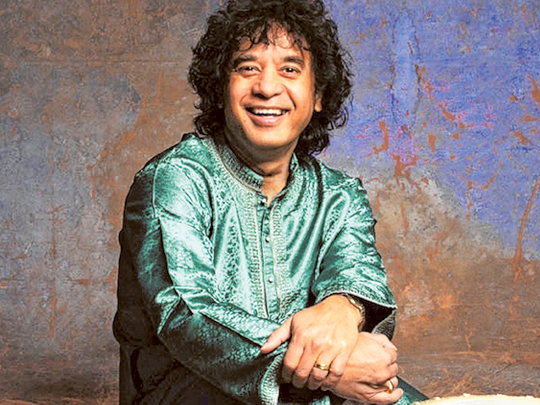
If the weekend’s Grammys have inspired you to broaden your musical horizon, then Indian classical tabla maestro Ustad Zakir Hussain is here to help. Performing in Dubai On Thursday in a concert titled Nirvana 2013, he will be joined by Edgar Meyer (upright bass), Bela Fleck (banjo), U Srinivas (mandolin) and Rakesh Chaurasia (flute), whom between them, have over 43 Grammy nominations among them. Ahead of their concert at Shaikh Rashid Hall at Dubai World Trade Centre on Thursday, tabloid! caught up with Hussain.
Excerpts from the e-mail interview.
Q: You are returning to Dubai for a concert after a gap of four years. What should we expect from Nirvana 2013?
A: Expect a dynamic concert with five musicians who enjoy playing music together. It will be an interesting balance on stage as Western classical music, bluegrass and folk music play together with Indian classical music.
You will also get to hear the rhythmic repertoire in Indian classical sounds with elements of Latin, jazz, Afro-Cuban and Indian folk music. We promise an exciting evening.
Q: What do you think is the relevance of Indian classical music in today’s times?
A: Indian classical music is a source of inspiration to all new music. It is one of the premier forms of music recognised all over the world and this is also used as a sound-source by modern composers.
Q: Have you ever been tempted to tweak your traditional style to suit the tastes of the Justin Bieber-generation?
A: What is the Justin Bieber generation? Don’t sell this generation short. Today’s generation is the most diverse and versatile music listener.
Q: Is Indian classical music commercially viable a venture?
A: As I said earlier, Indian music is known the world over and Indian musicians are constantly travelling throughout the year performing at concert halls in all major cities of the world. Commercially viable? I would say absolutely.
Q: 2012 has been a grim year for the world of music. We have lost out on musical greats such as Pandit Ravi Shankar and Mehdi Hassan. Does their legacy make you evaluate your own music?
A: Indian music has shades of their legacy and I would say that it’s not that I have to evaluate my music in light of masters who have passed away. I would use the word ‘inspire’. I have been inspired by both the artists you have mentioned.
Q: If there’s one musical legacy that you would like to leave behind, what would it be and why?
A: I hope I have helped in creating a sense of self-belief among today’s young musicians.
Q: What’s the biggest misconception about Indian classical music that you have helped obliterate through your music?
The biggest misconception about Indian classical music is that it’s irrelevant and not commercially viable.
Q: Tell us about your future plans?
A: Bela [Fleck], Edgar [Meyer] and I will play with the Symphony Orchestra of India in Muscat and head to Mumbai. The rest of this year promises to be quite special. The SFJazz Festival is opening a new centre in San Francisco and has chosen to showcase my music over five nights in March as a part of its inaugural season. After that, I will tour with my long-time colleague Pandit Shivkumar Sharma. Then in autumn, I will embark upon a Remember Shakti tour.
Q: If you could collaborate with one musician, who would it be and why?
A: It’s impossible for me to answer this question because there’s miles to go before I sleep.
Q: Are you influenced by popular sounds or do you think the two don’t really mix?
A: I have been influenced by the constantly changing landscape of music from all corners of the world. If one listens carefully, it is evident in my music.


